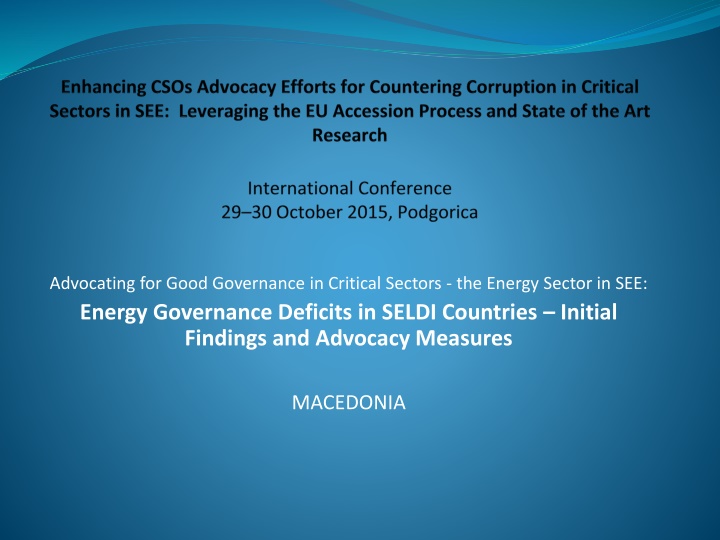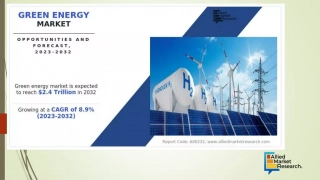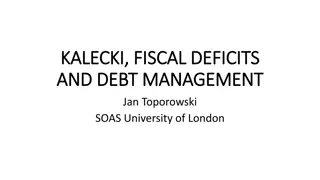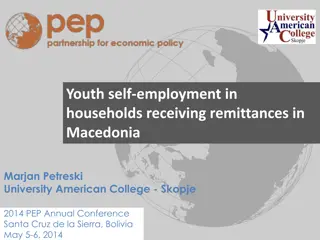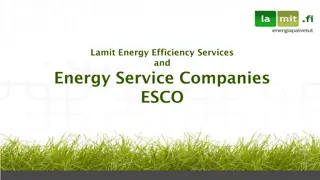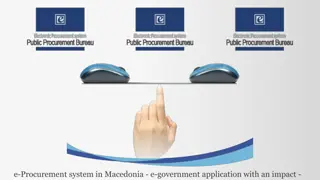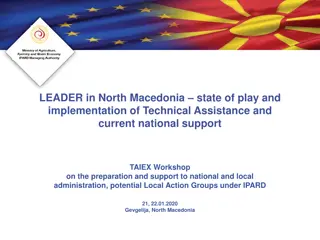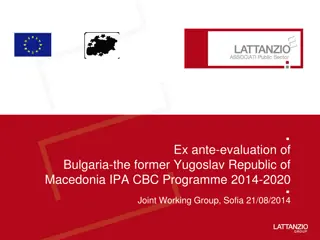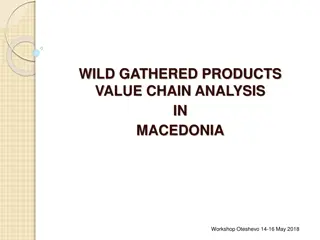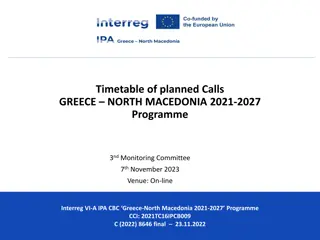Energy Governance Deficits in Macedonia - Initial Findings
Advocating for good governance in the energy sector in Macedonia, focusing on key statistics, legal framework, and the implementation of existing legislation to address energy challenges and enhance regulatory capacity.
Download Presentation

Please find below an Image/Link to download the presentation.
The content on the website is provided AS IS for your information and personal use only. It may not be sold, licensed, or shared on other websites without obtaining consent from the author.If you encounter any issues during the download, it is possible that the publisher has removed the file from their server.
You are allowed to download the files provided on this website for personal or commercial use, subject to the condition that they are used lawfully. All files are the property of their respective owners.
The content on the website is provided AS IS for your information and personal use only. It may not be sold, licensed, or shared on other websites without obtaining consent from the author.
E N D
Presentation Transcript
Advocating for Good Governance in Critical Sectors - the Energy Sector in SEE: Energy Governance Deficits in SELDI Countries Initial Findings and Advocacy Measures MACEDONIA
Key Statistics Population GDP/Capita Electricity Market Size Installed Capacity 2.065.769294 (31.12.2013, source: State Statistical Office) 3.931 (for 2013, source: Ministry of finance) 6.960 GWh (total consumption in 2014) Total: 2.011,25 MW (TPP:1010 MW, HPP 603,2 MW, SHPP 59,9 MW, CHP: 287 MWe, PV: 14,75 MW; WPP: 36,8 MW) Net Electricity Importer 3.072 GWh (import in 2014) Natural Gas Imported 134.663.666 nm3in 2014 Natural Gas Consumed 134.663.666 nm3in 2014
Since its candidate status in 2005: Align the legislation on the internal electricity and gas markets, energy efficiency and renewable energy sources with the EU acquis in order to gradually open the energy market to competition; Strengthen the independence of the Energy Regulatory Commission; Start implementing the Energy Community Treaty; Enhance administrative capacity in all energy sectors. Macedonia has signed the Treaty for the establishment of a European Energy Community in October 2005. Macedonia is also a signatory country of Memorandum of understanding on the regional electricity in South East Europe and its integration into the European Union Internal Electricity Market. Macedonia performs reasonably well overall and with respect to its grouping (Group B). Within its Group, Macedonia has an electricity sector score of 0.866 relative to an Energy Community average of 0.860 for Energy Community contracting parties only and 0.827 for Energy Community contracting parties and observers (with 1.0 reflecting full adoption and implementation of best practices as identified in the benchmarks and indicators of this Assessment). The gas sector is too limited for rating.
Legal Framework Legal Framework for Ownership Transformation: Constitution of RM (1991) Law on Social Capital (1989) Law on Transformation of Enterprises with Social Capital (1993) Law on Public Enterprises (1996) Law on Privatization of State-owned Capital (OJ 37/96). Energy Law (1987, 1994, 1997, Official Gazette of the Republic of Macedonia no. 16/2011, 136/2011, 79/13,164/13, 41/14, 151/14 and 33/15) In September 2009 the Government issued an Action Plan for compliance of the national legislation with the EU legislation on electricity and natural gas. New amendments of the Energy Law and other bylaws are under preparation in order to increase ERC's competences, market competition and security of supply. New Energy Law shall be issued implementing the Third package of EU legislation on internal energy market in Republic of Macedonia.
Implementation of existing legislation Macedonia suffers from limited energy resources and meets 32% of demand with imports. Demand as well as import prices are increasing while domestic supply is not, making security of supply of particular importance. Assurance of adequate supply is addressed annually by an energy balance set by the Government, with the opinion of the ERC. Authorization of new capacity lies with the Ministry, not with the ERC. The market operator submits to the Ministry and the ERC, once a year, five- and ten-year forecasts, and plans for demand and supply. Current legislation does not provide for a supplier of last resort, although in practice, this function is being performed by the regulated retail supplier, EVN Macedonia. According the SEE Sustainable Energy Policy study, Macedonia offers a dramatic contrast between its speedy adoption of laws modelled on the EU acquisand its poor results in what those laws are designed to achieve.
Reforming stages: Macedonia is now within a second-stage phase of addressing the growing pains of its relationship with that privatized distributor and is in the process of updating its legal and regulatory framework not only to ensure compliance with EU/Energy Community requirements, but to address issues made apparent through application of the existing laws and regulations. One challenge is addressing non-technical losses in areas with ethnic tensions. Macedonian Energy Sector before Reforms: Electric Power Company of Macedonia (ESM) vertically integrated socially owned enterprise Oil refinery socially owned enterprise Gas pipeline for distribution of natural gas from Russia socially owned enterprise District heating company for the City of Skopje socially owned enterprise Coal mines socially owned
Overview of Privatization in the Energy Sector Up to 2004 the vertically integrated and state owned company Macedonian Electricity Company (MEC) exclusively provided generation, transmission, distribution, and supply of electricity. As a result of the restructuring and privatization process in the electricity market currently are three separate and regulated monopolies: Generation the state-owned MPP; (Macedonian Power Plant) electricity part generation of the company generates more than 90% of the nation electricity. Transmission the state-owned MEPSO; and Distribution and supply the privately owned EVN. (in 2006 ESM was privatized by EVN)
No competitive market! Aside from lagging as to the percentage of customers deemed eligible, market development is hindered by EVN Macedonia's inability to purchase power on the market under Article 82(2) of the Energy Law from anyone other than ELEM unless the ERC approves and market prices are more favorable than the regulated price. Pursuant to the 2008 amendments, the wholesale supply function as a practical matter has been transferred from MEPSO to ELEM. This, along with ELEM's dominant position in generation, presents market competition concerns!
Potential Corruption Risk: private-public partnership In 2014 Government has announced its intention to privatize the 100% state- owned MPP by increasing its share capital (51%) and offering private investors the opportunity to purchase up to 49% of newly issued shares. The estimated value of 49% of MPP s shares is approximately EUR 750 million. Therefore, this will be the largest privatization in Macedonian history (the largest Macedonian privatization to date was the EUR 388 million sale of Makedonski Telekom to Hungarian Matav in 2001). EVN privatizaion-255 million EUR, through an international public call for a trade sale in a one-round bidding process.
Corporate governance The Government, upon proposals from the Ministry, is tasked with adoption of the energy strategy and energy primary legislation. In June 2009, the Ministry presented a draft text of the Strategy for Development of Energy for 2008-2020. A public consultation and comment process is (should be) underway; However, since 2014 no public and comment process was open on ENER on upcoming new energy legislation. Public Enterprise power Company of Macedonia is providing assistance to the Government of Macedonia for the restructuring of the utility company Macedonian Electric Company with the goal of converting the state owned enterprise into privately held, publicly regulated utility. The ERC, which began operation on 1 January 2004, has five board members and 12 staff members. The board members are proposed by the Government and appointed by the Parliament, for fixed five-year terms, subject to one reappointment. Salaries are set in accordance with the ERC's internal rulebook, with the ERC submitting to Parliament by October its proposed financial plan for the upcoming year, which sets forth all ERC revenues and expenditures, including the salaries of the members of the ERC and the employees, So far there has been only one decision by the Competition Commission of Republic of Macedonia against EVN Macedonia for abuse of its dominant position on the relevant market, which was confirmed by the Supreme Court of Macedonia
Energy Regulatory Commission Energy Regulatory Commission of the Republic of Macedonia (ERC) is provided by the Energy Law. ERC is comprised of five Members, one of which is the President. On the proposal from the Government of the Republic of Macedonia, the Parliament of the Republic of Macedonia appoint and dismiss the Members and the President of the ERC. The ERC has the authority to fix tariffs, issue tariff methodologies, set connection costs, issue licensing rules, issue and modify licenses and address complaints from energy companies (though not from households as suppliers are obliged to set up internal complaint procedures, approved by the ERC, to address these). It also has broad powers to investigate, inspect and require production of information; By 31st March in the current year the latest, ERC submits to the Parliament of the Republic of Macedonia the Annual report on its operation for the previous year for adoption.
Corruption RISKS The Government, not the ERC, identifies by decree which customers may be eligible and when; however, in June 2009, the Ministry of Economy requested an opinion from the ERC regarding the second phase of market opening; Aside from lagging as to the percentage of customers deemed eligible, market development is hindered by EVN Macedonia's inability to purchase power on the market under Article 82(2) of the Energy Law from anyone other than ELEM unless the ERC approves and market prices are more favorable than the regulated price. Pursuant to the 2008 amendments, the wholesale supply function as a practical matter has been transferred from MEPSO to ELEM. This, along with ELEM's dominant position in generation, presents market competition concerns. Tariffs are uniform throughout the country, using a revenue cap approach for all regulated activities. To date, no measures have been taken to address affordability constraints and the needs of vulnerable populations.
Corruption Risks As one state-owned public service generator (ELEM), the company owns most of the generation in Macedonia and provides 96% of domestic electricity production, which, in turn, supplies 65% of total supply with the remainder from imports. The transmission system operator (MEPSO) is also the market operator. MEPSO owns the transmission infrastructure and is responsible for maintenance, planning, expansion and construction of the transmission network, the management of the electricity system and the organization and management of the electricity market. (www.mepso.com.mk) EVN Macedonia buys power and electricity from ELEM, traders and distributed generators, as well as necessary transmission and distribution capacity and regulated services for the needs of the tariff consumers of electricity connected to the distribution network at regulated prices. (www.evn.com.mk) In 2012 the Antimonopoly Commission of Macedonia filed misdemeanor charges against four electricity trading firms on suspicion that they created a cartel so they could dictate the price for electricity imports through their bids in a January 2012 tender. Later in the year the customs office also charged three electricity trading companies additional customs duties, saying that they had used various methods to evade paying these fees; There is no publicly available information on whether the companies paid what they owed, or whether prosecutions have ensued.)
Risks Indicators: case study-ELEM Detailed information about their anti-corruption programs (neither whistle blowing mechanisms to staff training and publicity of corruption cases); There is lack of publish complete lists of their affiliates, subsidiaries, joint ventures and other related entities; There is lack of published individual financial accounts where they operate; There is a lack of the personal biographies of the Board Member of ELEM is either lacking or not complete; There is a lack of AUDIT reports and financial reports are particularly published only for the period of 2010-2013
